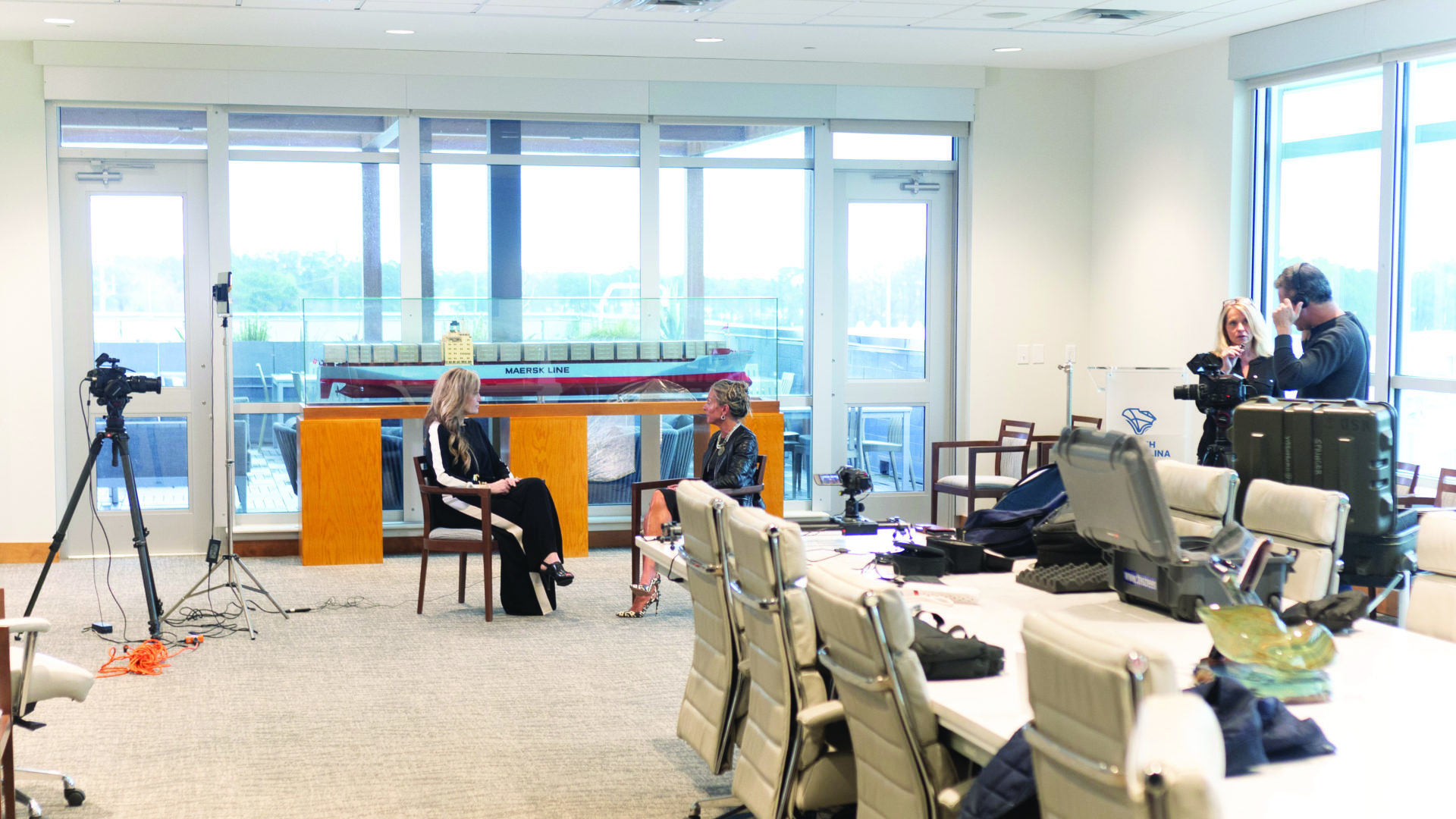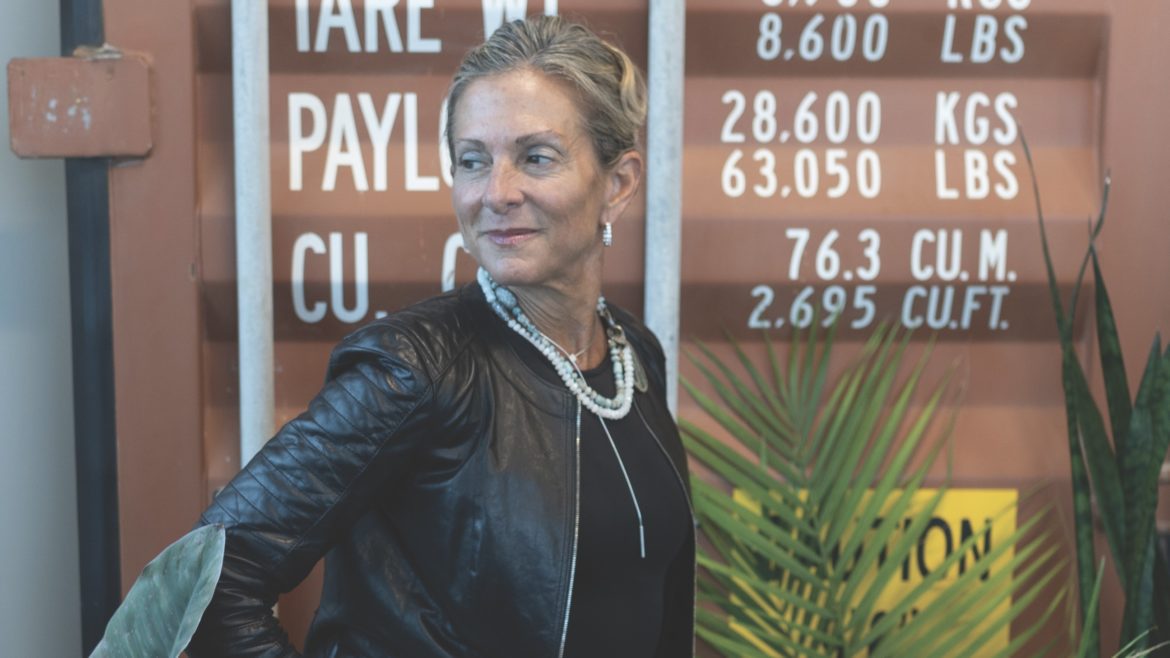“. . . Don’t avoid finance, accounting, or business . . . have some major or minor that allows you to have a good grasp of business because the worst feeling you can have is being uninformed.”
BARBARA MELVIN is the sixth president and CEO of South Carolina Ports, and the first woman to lead a top 10 U.S. operating container port. Prior to her unanimous appointment by the S.C. Ports Board of Directors, Barbara served the ports for 24 years, joining in 1998, during which time she served in a variety of roles. In 2015, she became senior vice president of operations and terminals and in 2018, assumed the position of Chief Operating Officer, overseeing the daily operation of the port as well as major infrastructure projects, such as the Charleston Harbor Deepening Project.
Barbara was recognized as the 2021 Woman of the Year by the South Carolina Manufacturers Alliance on International Women’s Day. She was honored at the 3rd Annual Palmetto Women’s Manufacturing Forum, which recognizes the impact of female leaders in the manufacturing field. To this Barbara observed, “I am looking forward to the day when there are not awards recognizing women in their field because it will no longer be notable, but rather there will be awards that recognize women purely for their work and contributions.”
Other than you, in the nation’s top 10 ports, are any women serving as CEO?
Not currently.
Then, let us start at the beginning. Where were you raised?
I was born and raised in Fort Valley, Georgia, which is a small town, in central west Georgia. My dad was born and raised there, also.
How would you describe your mother and father?
My father worked for Bluebird Bus Company and John Deere and was always involved with farming and agriculture. Fort Valley is known for peaches, pecans, and Bluebird Buses, which were the primary choices for work. Dad was an only child, which is often a tough relationship because nobody is good enough for an only son . . . my mother on the other hand was from Latrobe, Pennsylvania, known for Rolling Rock Beer. Her family was Polish and Italian, so her experiences growing up were different. When she moved to the south where my dad obviously lived, she had never seen a black-eyed pea. I had dramatically different influences from my parents.
You are Catholic?
I am. I was raised and educated by nuns, which is a journey in and of itself. I later attended public high school, so I received the best of both worlds. I had a good start in a smaller school and then was able to experience a lot more of what I would call the “real world” in a public high school.
You have a sister, tell me about her?
Yes, and she is one year older than me. She is a professional, the brains of our family. She went to Mercer University on a full scholarship and has always been involved with mainstreaming children into education who have difficult challenges where opportunities are lacking. She lives in New Bern, North Carolina.
Your parents moved to Charleston?
My mom and dad celebrated their 50th wedding anniversary before they moved to Charleston. I believe they were married 56 or 57 years before I moved them here. My dad passed away three years ago, in April. I think one of the most interesting things that my father ever said to me was, “You were right. I should have moved to Charleston earlier, so I could have enjoyed Charleston instead of just experiencing the healthcare system here.” They had a hard time having children, so I was born later in their lives.
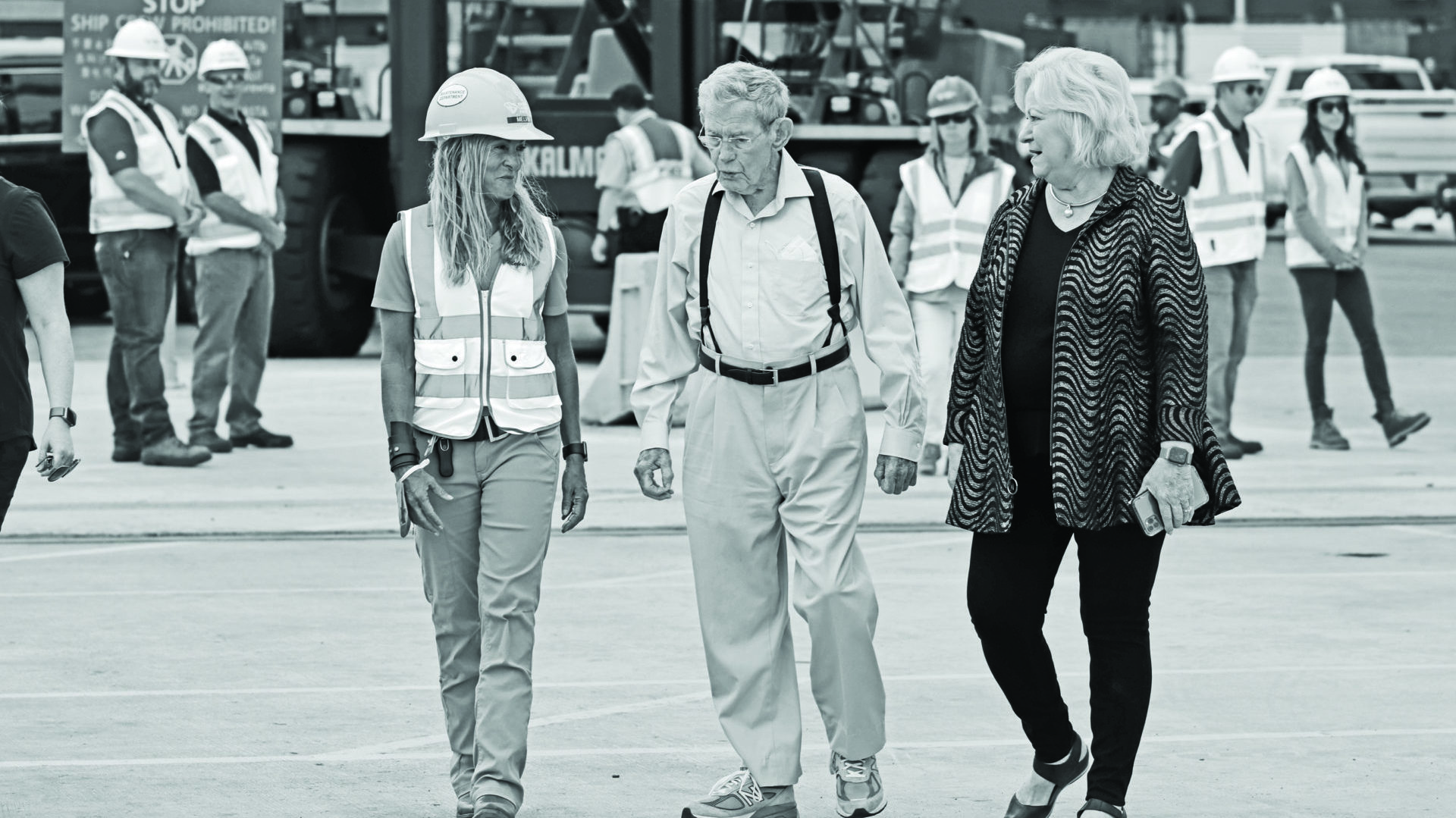
Who had the most influence on your life?
My dad was the most influential person in my life. He died at 83 years old.
Was that expected?
It was probably overdue. He had lived such an amazing life. Parkinson’s disease is the most devilish and destructive disease I have encountered. It not only takes your body, but then it starts to play tricks on your mind. He reached a point where he really felt like a burden and he had never been that way. He was such a caregiver, such a provider. He was the person who told me I could do anything. As a young person, I wanted to play football because I was pretty athletic. He said, “Look, if you want to play football, play football.”
Did you play football?
No, because they would not let girls play football when I was in high school. I wanted to, so when I moved to Atlanta, I played in an intramural league. Our football team actually won.
You are a hundred pounds dripping wet . . .
Dripping wet, but fast as you can possibly imagine, and I can catch anything around me.
By just appearances, you would never assume your athleticism. People would say, “She is so feminine and pretty . . .”
Those people don’t know me either.
You attended Georgia Southern?
I applied to one school and thank goodness I was accepted. I looked at the SAT scores that are required today for admittance to any kind of public university and I think to myself, “ Good Lord, thank you for letting me go to college more than three decades ago.” I loved Georgia Southern. It was a great experience. I was in a sorority, a little sister for a fraternity, loved all of my teachers, majored in political science. One quarter I was recognized as a standout in political science which allowed me to be with other majors and disciplines at Georgia Southern. We were introduced to different industries and opportunities in the state of Georgia. I really took advantage of that opportunity and until today that quarter was the most interesting part of college.
What was the path that led you from Georgia to South Carolina?
Through Atlanta . . . After school, I moved to Atlanta, worked for Max Cleland in the secretary of state’s office, helping with incorporation filings. I was moved to the governor’s office under Zell Miller for planning and budget purposes and worked on different agency budgets and executive order implementation. I moved to Charleston in 1996.
Give me one takeaway required to be successful in politics in the south?
To understand that Democrats are not Democrats and Republicans are not Republicans. Politics in the south has people who are motivated to run for office because they want to help people. Regardless of what you see from a national level, in the south, politics is about helping people.
Your first foray at the South Carolina Ports Authority was in what position?
Government relations. I think my first title was Government Affairs Liaison. I can only imagine what my parents thought, “What in the world is she doing? . . . affairs, liaisons, relations” I was grateful that they saw me move into operations so that they could tell people I wasn’t a piano player in a whorehouse, because it did not sound any worse than that did.
During your tenure at the Ports, the state transitioned from a Democrat leadership to Republican leadership. You have sustained friendships across the aisle throughout that timeframe, how did you accomplish that?
You have to be friends with everybody. I have always been lucky to represent business with a “meat and potatoes issue.” I was never caught up in partisan politics because if you are representing a business like the port, that impacts people’s lives positively, not only from a job perspective, but just from generational opportunity, you bypass party lines and the issues that segregate our political party system.
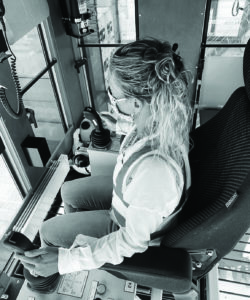
You are approaching two and half decades at the South Carolina Ports Authority, the state’s largest economic engine. Of all the positions that you have held including service as CEO what was your favorite and why?
Operations, absolutely, operations. While there were many successes in the government and public relations field, our operations team here at the South Carolina Port is just second to none. The creativity and the love for what they do is what keeps me going every day, not to mention the overall positive impact we have on the state’s economy. Just two very different examples show this; like keeping the BMW plant open during the pandemic because our operations were so fluid. In contrast, making a significant investment in the underserved Dillon area, where one container of yams needs to get out of the port because of seasonality. You see, it is just as important to the yam farmer as the manufacturer to have a fluid and multipurposed port, both are our constituents.
In your formative years was there one person in particular that believed in you and changed your life trajectory?
I have watched strong leaders, who taught me two impactful lessons; celebrating victories and learning how to take bad news with grace. If you react the same way to the wi-fi going out as you do to an accident on the terminal, people will stop telling you things, and then it is too late. The caliber of the leadership in the Port’s board members like Chairman Bill Stern, who has served the port for so long, changed my life.
How many years has he been in service?
Bill easily served 15 years as chairman let alone a member of the board. He is selfless in the way he approaches the Port, as if it is his business. He gives as much time here as he gives to his family business, which means he is working 24 hours a day. And, when you own a family business you can never disengage.
What other influences impacted you or challenged you, to that degree?
The Liberty Fellowship Program gave me the confidence to be the type of leader that I genuinely am, rather than what somebody expected me to be. The former CEO Jim Newsome taught us service in this industry and how to view what our customers—Ocean Carriers want to see from a port. His background and experience are invaluable.
Did you have any idea you would land here?
The day I graduated, my dad looked at me and he said, “I am so proud of you. You graduated with honors . . . now, what in the world are you going to do with a political science degree?” And I said, “I don’t know dad, but I am not staying in Fort Valley.” “Outside of teaching,” he said, “I have no idea what you are going to be able to do.” I said, “I am moving to Atlanta to find out.” And so that was it.
Are you a risk taker?
Risk taker and I am a highflyer.
What a dichotomy. For almost 25 years you have worked for the same organization. How do you reconcile highflyer and that level of work consistency . . . two differing patterns of behavior?
I’m not sure . . . other than government relations is, in and of itself, full of risk. Even if it is the same job, it is not the same issue every year. If you are out of government relations for even six months, your relevance decreases dramatically because you are not in front of the legislators and therefore not bringing them relevant issues. The risk I took by going into operations and literally not knowing what might happen was pretty significant.
How was your new role, as CEO of the South Carolina Ports Authority, received by the political stakeholders in the state?
When the CEO announcement was made, the texts poured in from our current legislators, and those who had retired, legislators who had started their careers and advanced as governors, congressmen, senators. It was a shared sentiment that, “our little girl did good . . . our little girl graduated.” To the legislators that knew me well, they were proud and excited for me. It is amazing. I repeatedly heard, “We knew you could do this,” or “You earned this.” To hear those words from someone like a Senator Leatherman, that I “earned” a position (because he earned everything he did) meant everything to me. I miss him, you know.
How did Senator Leatherman impact your career?
Senator Leatherman was a leader . . . and a leader will “lean in” and take a risk on someone that they think is going to have an impact, beyond their years. He did that for me. I will continue to be grateful for his vision and trust and I will try to make him proud every day.
Is there a succession to Senator Leatherman in our current legislature’s leadership and vision for the Port?
Chairman Peeler has taken that role, has been that support for the state and for the Senate finance committee. He has been there the whole time and we are so lucky as a state to have the cohesiveness around the economic development policies. Sure. We have our differences, but around the things that matter . . . from jobs, business strategy, recruitment and foreign direct investment, there is a consistency that crosses party lines (Democrats and Republicans), as well as across the institutional aisles . . . whether house or senate. What is best for South Carolina is what bonds those serving in politics. The love for this state, whether you are from here or not, is infectious.
What number does the state of South Carolina’s Port Authority rank nationwide?
We happily are number eight in the country for container ports.
What was your path to assuming your current position as CEO?
Jim Newsome, the past CEO, came to me when we realized that we were far behind on our harbor deepening project for the port. He said he needed me to run the project which is typically run out of engineering. I did not know anything about a harbor deepening project either. He told me that the technical knowledge was not the impediment, what was needed was “to move barriers.” In hindsight, I think he was crazy for giving the project, of that magnitude, to me. But he was correct, they had all the engineers they needed, but what they really lacked was somebody who could manage the project from “soup to nuts.” Not knowing anything about harbor deepening, we not only got the project done, but we also secured the funding. Both aspects of my professional training were utilized. Later, Jim came to me and he said, “If you can do what you just did, you can do anything.” We talked about operations at that point. I could have easily messed up anywhere along the way. But when the board sent me to get my EMBA in global supply chain, I knew they wanted me to learn the financial aspects of the CEO role. That was a strong hint.
You earned an Executive MBA from what institution?
University of Tennessee which was an intensive 13 months, with time abroad in China and Europe. We spent time in Shanghai, and a province right outside of Shanghai and then Hamburg. I graduated with that degree and had a variety of classes. Besides strengthening my financial acumen, it allowed me to have meaningful conversations with my CFO, and not be lost. The experience taught me how to bring together the C-suite, because silos are horrible. They exist, but you have to make them go away to have a successful organization.
How often do you put work boots on?
More than once a week.
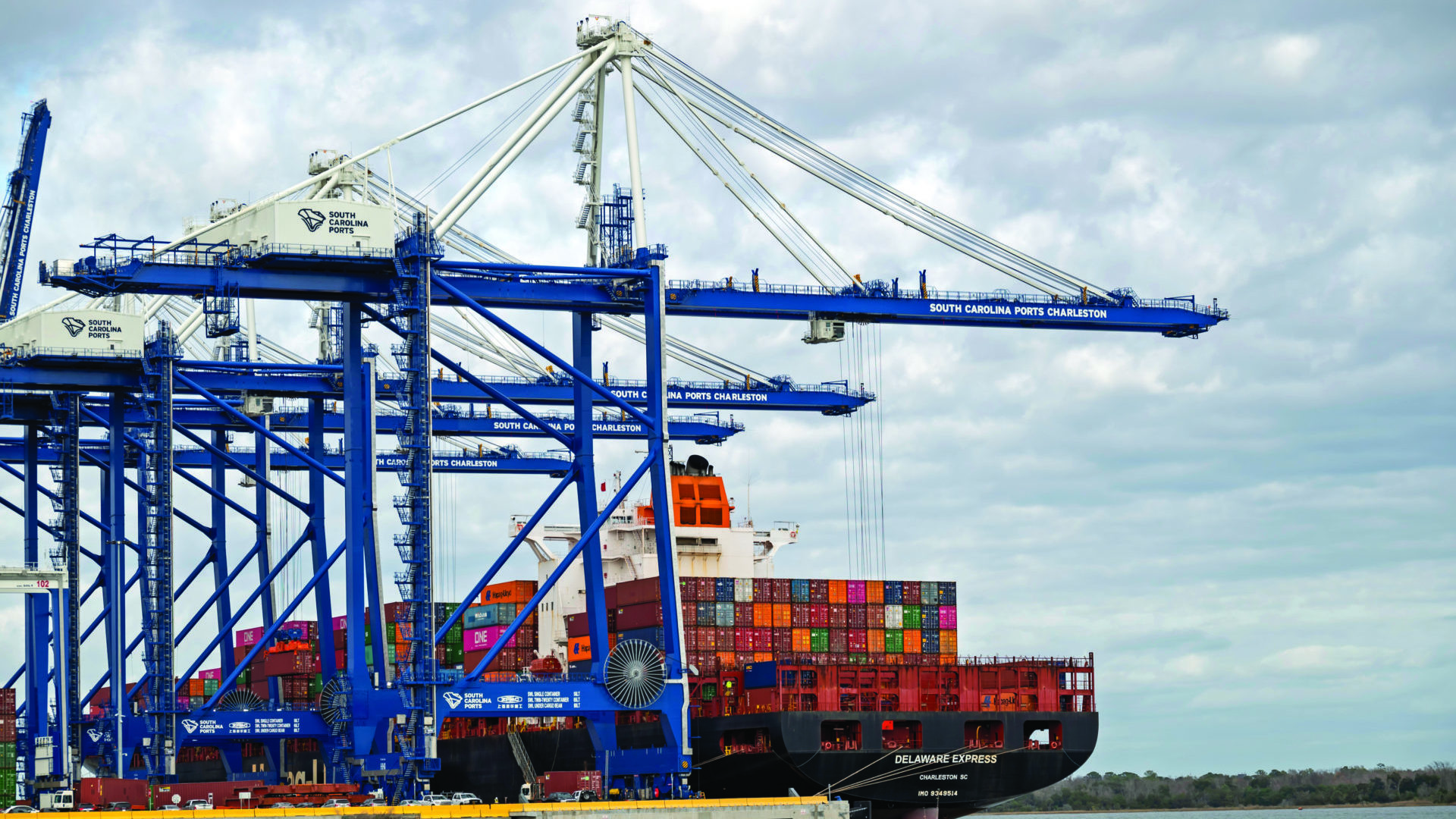
The Port of Charleston is robust and complex. Share with the reader the Port’s reach and impact.
We have an amazing footprint for a state of our size. We have three container terminals in Charleston. We have a sophisticated breakbulk “roll on, roll off” terminal. We have a cruise terminal, two inland ports and then we have a port in Georgetown, which is struggling because it was the victim of a cargo shift to bulk. Historically the terminal used to handle containerized cargo.
Let’s talk about the two inland ports starting first with Dillon.
Dillon is our newest baby, growing up well and holding its own. It is on the CSX line. The lead client is Harbor Freight Tools, an importer which has about 3 million square feet under roof in Dillon, South Carolina. When we were planning this expansion, we called the project Pedro. Amazingly, nobody figured it out we were putting an investment in Dillon where the focus is on bettering Harbor Freight’s life. Being a major importer allows us to have a lot of empty boxes. That area is a rich area for exporters, whether that be the border in North Carolina or the farming area or frozen chicken, ham, things of that nature that are in the area as well.
Dillon had every “ingredient” for that location decision to be extremely successful. It was surrounded by land, so we were not having to hem ourselves in between big companies that were already in existence. I look upon that as one of the most significant things we could have done for an area of the state that was starving for additional economic development. When you look at the decision for locating an inland Port financially, though it is not our blue-ribbon winner, we make decisions that are propped up by other areas of our business. Because of the statewide impact, the economic development in that area, and the movement of freight, it is a sound decision.
And the second inland port?
The inland port in Greer on the Norfolk Southern line was born out of the need for creative alternatives to moving significant amounts of automotive freight by motor carrier. What we were able to do was take a rail line and basically turn it into an overnight service and make it competitive with trucks. The volume that we were able to generate was beyond our wildest dreams. What was originally going to be similar to Dillon and be import dominated, is now an export dominated facility with more than 160,000 rail lifts in one year. I would dare say it is probably the most successful inland port, definitely on the east coast and probably not rivaled in the country.
These inland ports are so important you have to think of them as the closest valet lot at an airport. The parking there is so valuable. Inland ports give us relief valves and a way for people to utilize the space that they need for containers, storage in different areas on rail lines. Trucks still have to drive to get your container from there, but they are driving much less distance. I think the concept of inland ports is catching like wildfire. We see competitive ports investing in inland ports, since we did. I still think we have the best.
What is the economic impact of the South Carolina Ports Authority?
The most important metric we share is that we are responsible for one in 10 jobs directly or indirectly. Everybody from the person who works directly for us in Dillon, to the person who’s working with Harbor Freight. These jobs are important, and having a port is so important for the attraction of foreign direct investment or in manufacturing, advanced manufacturing or now retail.
E-commerce, and the way we buy things as consumers has allowed us to get into a game that we weren’t in before, because we just weren’t a high population state. I think the impact that we have is tremendous. Most people think our impact is mainly in the Charleston area, but if you look at our impact it is split among four regions. Our greatest impact is in the upstate inland port with more than 50%.
Who would you see as our top competitor?
We are in a gas war daily with the Georgia Ports Authority. They are a tremendous port and are well run. We are unique in that South Carolina and Georgia are operating ports. When we need to do something, we can do it. We are in the fastest growing region of the country and we fight for every bit of cargo. But the great news is there is enough cargo for both of us. Both ports will be successful.
Has the Port experienced supply chain challenges?
Wow. Supply chain issues. During the pandemic, the US consumer was on a spending spree and import demand grew by about 20%. Port capacity is extremely rigid, and you can’t sneak a new port in overnight. Consumers just kept buying. They looked at their Zoom calls and thought, my sofa looks horrible. And boy, I need a piece of artwork behind me because I can’t leave my house. Why not do some improvements in our backyard to make our escape. Purchases were made and orders kept coming. Import demand around the world did not grow anywhere near what it did in the United States. The issues that were simmering under the surface pre-pandemic really just had an accelerant of the pandemic thrown on them. And they became evident.
We do not have enough distribution center space. We have for decades talked about how we can better attract drivers into the motor carrier industry. We don’t have enough chassis. (For people who don’t know what a chassis is, it is the box a container sits on). When you don’t have enough of those or you can’t unload the box that is at the warehouse, then you are tying up a chassis, a box and warehouse space. And if you don’t have a driver to get it there . . .
Our industry really saw tremendous backup on the west coast. We didn’t experience the bottle neck until after the Thanksgiving holidays. We have been in the throes of supply chain issues ever since. We had never experienced a vessel queue here before the pandemic. We don’t know how to not be the most productive port. We are experiencing that every day now.
Is there an apex to this?
I think we have hit it. We have had a high of more than 30 ships in our vessel queue. We are down now, but it will take time to absorb all of the inventory. We don’t have enough warehouses to get inventory out to stores by the motor carriers that we still need to attract.
What is the biggest hurdle or concern?
We must do a better job as an industry of attracting motor carriers. Not only from the recruitment side, but how they are treated. It is amazing to me that in this country, we bake cupcakes for the Amazon driver, but we hate to see a truck beside us on an interstate. I can promise you that package was not born in the back of the Amazon van. It got there from a motor carrier. Our biggest challenge in this country is to attract talented people to the workforce.
What is next?
Six years ago, the state invested $3 billion, spanning through 2033. In front of our general assembly now, is a dual served intermodal rail facility and a barge. Again, another creative alternative to only moving things by truck.
And that’s anticipated to pass this legislative session?
We’re very hopeful and if it does, we will have that facility open and the barge opportunity available by 2025.
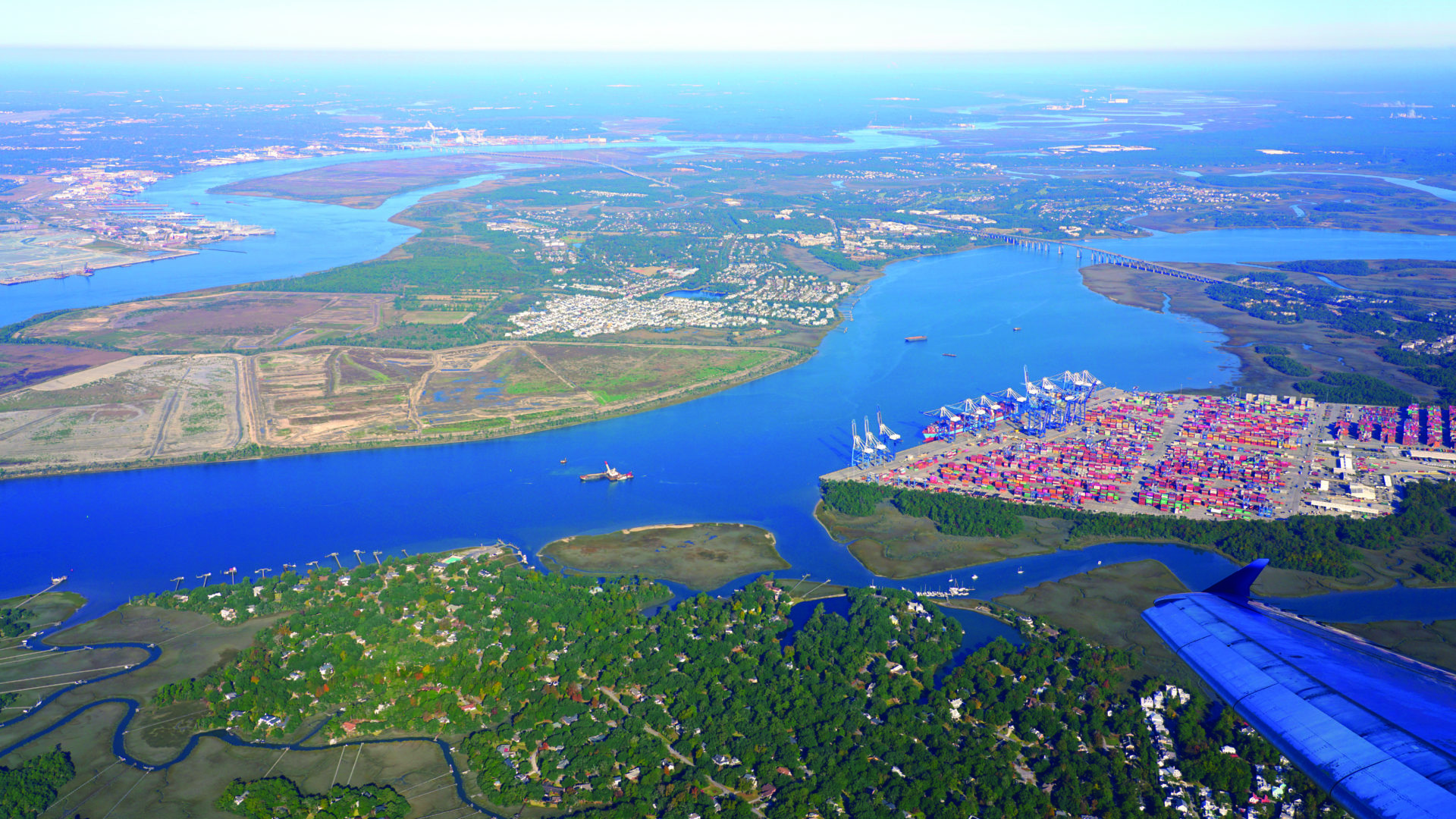
How challenging is the relationship between the state’s largest economic driver, tourism, cruise ships and the environment?
Having diversity in our market segments is crucial. While we are dominated by containers, South Carolina has such a variety of offerings that we, as a port, need to be responsive, with whatever our state is focusing on. Whether the cruise portion is popular, not popular, does not matter because cruises are popular with the people that take them, and you can operate the terminals in a responsible way. Our break bulk area, which is really automotive in South Carolina, swings well above our weight and as a matter of fact, ranks number one in the automotive industry. Whether that is a finished vehicle or rubber for tires or wire rod for the tire mechanisms, we have to be able to support those industries that have made capital investments in South Carolina.
Do you make a strong effort to build relationships with the different heads of each of the organizations? And what percent of your time is spent doing so?
Absolutely. I would say I probably spend 50% of my time relationship nurturing and building and then 50% of my focus is truly dedicated to operations. I rely a lot on the team. They come to me when they can’t solve something or really need additional approval, but not for everything. The team is quite independent and highly skilled.
Is your strength, problem solving, nurturing or organization building?
Problem solving probably first. And then the close second would be between nurturing and relationship building. Because I don’t see those as very different.
I want to explore the personal Barbara Melvin. When you first saw your husband, did you know he would be your husband, someone to go through life with?
I did. I was divorced at 27 and declared I would never get married again. I was by myself for a long time. We had known each other but timing never was right…either I was dating somebody, or he was dating somebody. At a fundraiser, as a matter of fact for Glenn McConnell, we reconnected. That was it.
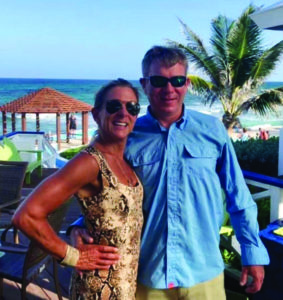
Was it physical or mental… and what in particular is it about him . . . ?
Mental. He’s quiet. He does not get caught up in “competing with the Joneses,” so to speak. He is a hard worker and is as dedicated as I am. There is no amount of laziness and nothing superficial about him. He is a mechanic and can fix anything.
Do you tell him about what goes on at work?
No, I don’t have to. I think he hears it from a lot of truck drivers that he sees in and out on a daily basis. He probably knows a lot more than what he lets on because there are some days when I come home, and he will have poured me a glass of wine or fixed me a drink. He doesn’t even ask because he probably read something on Twitter, or someone came by the shop and said something. He has hobbies outside of me. It wouldn’t work if I was his hobby because I have too much other going on. If I was his hobby, our marriage would fail. He doesn’t wait on me to do things or make the decisions for me because he knows I make 5,000 decisions in a day.
What’s your favorite thing to do together?
We go down to the Florida Keys and we spend time on the water and relax and raise our dogs. We share that well.
You do not have children. Is that a decision that you believe women in the professional world must make?
Sometimes the decision is made for you. I admire mothers. I truly do not know how they do it. When my bio or CV is read for introduction purposes, people will say, “I don’t know how you do all this.” But I don’t know how moms do it. I could not get myself up and going in the morning if I had kids with me . . . I am just not that organized.
Has the ability to stay singularly focused on your professional career and a personal wellbeing been critical to your success?
I think it was helpful career-wise, but I don’t think that it is the differentiator either. There are so many successful women, more successful than me by far, who have children and who have done it well. I think it is a personal decision, the plan you make for your life. Once you have clarity, you make it happen.
Did you ever want kids Barb?
No, I didn’t even like babysitting. I am the type of person you go to in a crisis or an emergency because I do not get wrapped up in the emotional. I genuinely do care though.
I am curious about what drives you?
We have close to 900 employees now. I mother them because I want to take care of them. People who are happy and taken care of, produce to their highest level. One of the nicknames that I have here is Mama B. Among many, by the way, most not derogatory. I really care. The thing that drives me most crazy about people is, if your potential is at a “C” level, if you give me that “C” every day, I am so happy. But if your potential is an “A” and you give me a “C,” I am so disappointed. Not everybody has to perform at the highest level. I just want our employees to perform at the highest level they are individually capable of.
You hold yourself to that standard?
Absolutely.
From a personal “well-being,” how much sleep and exercise do you need?
If I get six and a half hours of sleep, I feel great. I exercise about two hours daily. I would do two hours of cardio every day, but I know that’s not good for my body. I force myself to cross train and I do weights once a week.
I know you are a runner but what other exercise regimen do you have and how do you feel post workout?
I love kickboxing. I do that twice a week for an hour. When I am done, I am dripping sweat and cannot imagine the next aggressive move I want to make.
How important is loyalty? On a scale of one to 10.
Nine. Decisiveness would be the only thing I would rank higher with a 10. Decisiveness is just more important here. I need the loyalty of a container handler to be, to safety, not to me. So that safety decision or decisiveness, I would rank a little bit higher than loyalty.
What does retirement look like for you . . . and do you anticipate retiring at the South Carolina Ports Authority?
Yes, I will. In April 2023 I will have been here 25 years. We have a strong team. I think it’s part of my job to make room for them to be able to grow. I pray every day for the grace to know when to leave rather than people sitting around saying, “Gosh, I wish she would go.” I pray for that grace all the time.
What’s the average age of a retiree?
I presume that would be older than when I will leave. I would say age 65 is the average, but not for me. I want to go enjoy life for a while. Will I fully retire? Probably not. I have had the benefit of developing a variety of skills that I might utilize later, and I will always be involved in the community no matter what community, whether I split time between two communities or whatever, I’ll always be involved, because I think you should give back. I have been fortunate, so I expect myself to give back a lot as well. While I have no plan for retirement, I will grow people to make sure that a plan is ready when the time comes.
Looking into the future, could anyone in leadership today step into the role?
Absolutely. The talent pool at this place is unbelievable.
What does the average workday look like for you?
I am up and monitoring when our gates open, right now that is three o’clock am. I exercise between four and six, take a quick shower and am usually in the office before seven am. I am here until the gates close, and sometimes later. I monitor emails, and twenty-four/seven people have my cell phone. The buck stops with me on operational issues which is why people that need it, have my cell phone. The only thing that stays on at night is the cell phone ringer. I always tell people, you have to call my phone if it is an emergency, because I don’t hear the text.
What do you want to be remembered for?
The greatest thing that I could be remembered for would be leading people, giving them the air cover that they needed to be the best leader that they, in turn, can be. I want the port to keep growing and climbing up that top 10 list, and at the same time, building it responsibly. I want to spread word around our state about the positive impact we have made. I hope to be known, not as this dominant person, but as a collaborator who realizes that “you cannot let the perfect be the enemy of the good.”
Do you say that to yourself a lot?
All the time.
You ascended largely because of your quest for excellence, and perfection.
I have to stop myself a lot.
Where do you find peace?
On the ocean. On my run. Most of the time by myself. I get peace when I am not holding a cellphone. When I have time to think.
How much alone time do you need a day?
I don’t need a lot. I practice yoga and that keeps me going if I can just do it once a week.
Do you have “chatter” or are you able to micro focus?
I can tune it out. I can listen to the chatter and pick up the two minutes of the hour that they taught, that really mattered. And then I put it back to them and say, “You could have said this in two minutes.”
What piece of advice can you give a younger woman that would have changed your life, something that was pivotal, that you wish you would have been told.
I wish I had taken business classes, not at the age 48. I would say don’t avoid finance, accounting business, or learning good business practices. Have some major or minor that allows you to have a good grasp of business because the worst feeling you can have is being uninformed.
That is great professional advice and I completely agree . . . but what personal words of wisdom?
People think I am fearless, but there was a pivotal moment in my life that I knew something was not right and I was too scared to speak up. I fixed it within a year. So, I would say, don’t get too caught up in the “ceremony” or let society tell you what you are supposed to be doing. Always stay centered around your gut feeling.
Are you fear based?
Not a bit. God bless. I wish I was. Probably a lot of people wish I was.
When all is said and done, what do you want the world to know about you?
That I gave it everything I had. I left nothing on the table.
